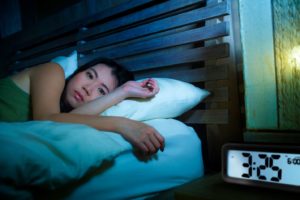
Throughout recent years, both casual observations by medical professionals and formal research have found a connection between anxiety and sleep problems. In fact, one study found that anxiety is present in roughly half of people with sleep apnea. Is it just a coincidence that these do conditions are often found in the same people, or is there some sort of cause-and-effect relationship between anxiety and sleep apnea in Fort Worth? Let’s talk about this important topic.
A Lack of Sleep Can Increase Anxiety
Without adequate sleep, the human brain simply cannot function at its best. When a person does not get enough shuteye, the body’s mood-controlling chemicals can get out of balance, leading to an increased risk of emotional problems. For example, a lack of sleep often interferes with serotonin production. Serotonin is associated with positive feelings, and without high enough levels of it, you may become sad, irritable, and anxious.
People with sleep apnea may do their best to avoid sleep deprivation by going to bed at a reasonable hour and taking other simple steps. However, they may still suffer from an inadequate amount of sleep due to the pauses in breathing that sleep apnea causes. When the body arouses itself to resume breathing, the sleep cycle is disrupted. For sleep apnea sufferers, that can happen dozens or even hundreds of times each night. Pauses in breathing can even send your body into “panic mode,” which naturally has the capacity to increase anxiety levels.
The Connection Goes Both Ways
The relationship between anxiety and sleep problems is a two-way street. If you suffer from anxiety, it may be quite difficult for you to fall asleep at night. Not only does this decrease the amount of time you spend asleep, but it can also worsen sleep apnea; the more exhausted you are when you finally do fall asleep, the more likely it is that you will suffer severe and frequent pauses in breathing.
What Should You Do?
Sleep apnea and anxiety can drag you into a vicious cycle of sleep deprivation and emotional difficulties. Fortunately, there are things you can do to break free. Here are a few suggestions to help you out:
- Seek sleep apnea treatment. If you aren’t sure if you have sleep apnea, consult with an expert who can help you arrange for testing. Then, you can explore your treatment options.
- Care well for your mental health. There is no shame in visiting a psychologist, counselor, or psychiatrist who has experience in helping people who suffer from anxiety.
- Mind your overall health. Things like eating a balanced diet and getting enough exercise can both improve the quality of your sleep and support your emotional wellness.
Sadly, sleep apnea and anxiety seem to go hand in hand. Taking steps now to address these issues can set you up for improved mental and physical health.
Meet the Sleep Apnea Expert
Dr. Mitch Conditt has been serving as a dentist for decades. In recent years, his focus has been primarily on helping patients address sleep apnea via oral appliance therapy. If you are interested in getting a better night’s sleep, Dr. Conditt and our team would be happy to serve you. Contact us at 817-527-8500.
